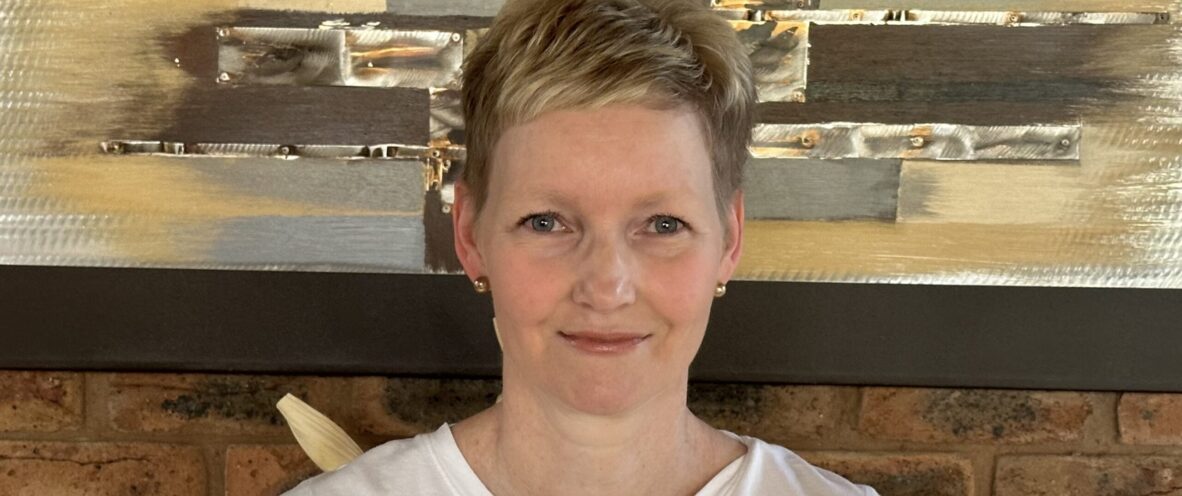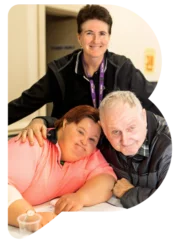The National Rural and Remote Health Awards are held each year and celebrate the outstanding contributions of individuals and organisations who work to improve health outcomes for people living in rural and remote communities.
This year our very own Melanie Pellizzer, a Broken Hill based Program Support Leader, was named one of three finalists in the Rural and Remote Aged or Disability Carer of the Year category.
We had the opportunity to catch up with Melanie before she flew to Canberra for the big night. We wanted to learn more about her work; what it is that inspires her compassion and dedication, and how she manages to give so much of herself to those in her care, every single day.
Background
Melanie was born and bred in Broken Hill. A country girl at heart, she grew up wanting to be a police officer but had a change of heart upon realising it would mean leaving the town, and the people, she loved.
Melanie stayed in Broken Hill, and now lives with Andrew, her husband of 27 years. They have twin 22-year-old boys: Nicholas, who works and studies in Adelaide, and Jack, who was born with a rare genetic syndrome called Okur-Chung Neurodevelopmental Syndrome and lives at home with his parents.
Okur-Chung Neurodevelopmental Syndrome is a gene mutation on Chromosome 20. The syndrome has left Jack, one of only 160 people worldwide to have the diagnosis, with profound physical and intellectual disabilities.
Raising twin boys is never easy, but when one of the twins has significant disabilities, life can become even more challenging – and all the love in the world does not make you a ‘Superwoman’.
“You’ve got one child with disabilities, who needs so much extra care, but you still need time and energy for your other child…it wasn’t easy, but my attitude is ‘it is what it is’. There’s not much you can do about it. You just have to get on with it and that’s the way it is. This is our home life. He is our son.”
LiveBetter
Before having children Melanie worked in banking. After having the twins, she joined the Department of Education in the Assisted School Travel Program, a program that supports children with disabilities travel to and from school. Melanie loved the work, and after nine years in the role she decided to apply for a Disability Support Worker role at LiveBetter.
And the rest, as they say, is history.
“I wanted to continue to support people with disabilities, and I’d have to say it’s the best thing I’ve ever done.”
Melanie says having a child with a disability was key to her desire to work in the disability sector. She wanted to make a difference in the lives of people who live with disability – and their families.
Twenty-two years caring for Jack, and nine years working in the Assisted School Travel Program, have left her well-placed to do this.
“Having a son with a disability myself helps create common ground. It helps me to relate to the families, and to understand their concerns – and it helps them to trust me to provide their family member with the best possible care.”
Twelve months ago, Melanie was offered the position of Program Support Leader at Karanda House, LiveBetter’s Short-Term Accommodation and Respite facility in Broken Hill. Although she admits to feeling a little overwhelmed at the start, she has since gone from strength to strength, and truly made the role her own.
When I started this role, it was very daunting, but I’ve had such great support. My Coordinator, the Area Manager, the Accommodation Manager… they’ve been fantastic. They’re always available if I need a hand.
For Melanie, something she really loves about her work is supporting and empowering those in her care to achieve the goals that matter to them, and watching their confidence develop and grow with each small success.
“It might be something simple, but if we can help them achieve it, and acknowledge that achievement – you can just see the joy on their faces.”
Melanie says she has learned much in her time at LiveBetter, and while acknowledging she still has much learn, she believes one of the most important qualities needed to perform a role like hers well is empathy – and that is a quality she possesses in spades.
“It’s so important to bring care and compassion to this role. Having a great rapport with the families and carers, understanding their perspectives, and having honest communication makes a huge difference. Because, at the end of the day, they’re trusting us to care for their family member.”
Quick questions:
- What is the best thing about your work?
“The customers – and my co-workers. We have such a great team here!”
- What is the most challenging thing about your work?
“Completing the staff rosters. That would be the most challenging thing, hands down!”
- Top Tip to manage work-life balance?
“Try to minimize taking your work home.”
What keeps you going, getting up and doing it all again, each day?
“I love my job. I think if you love your job, it’s not going to be hard getting up and going to work. I love my job. I love the people I work with, and I love the customers I care for.”
- Hopes for in the future? Where do you see yourself in five years?
“Professionally, still working at LiveBetter and personally – I love to travel, so definitely more travelling. Scotland and Ireland are on the bucket list – maybe after the next cruise…”
- If there was one piece of advice you could give to others who are starting in the community sector, what would it be?
“Remember that the more you give, the more you’ll get back – it’s a very rewarding industry.”

